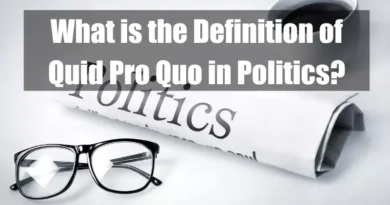Quid Pro Quo: What Does The Phrase Actually Mean
“Quid pro quo” is a Latin phrase that translates to “something for something,” indicating a mutual exchange where one thing is given in return for another. In business and legal contexts, it refers to an agreement where goods or services are traded for items of equal value. However, in situations like sexual harassment cases, “quid pro quo” describes scenarios where job benefits are conditioned upon sexual favors, which is illegal and unethical. Understanding the context is crucial, as the term can imply either a fair exchange or an unethical practice.
Takeaways
| Key Points |
|---|
| Quid pro quo” literally translates to “something for something,” signifying an exchange where one party provides value in expectation of receiving something of equivalent worth in return. |
| Derived from Latin, “quid” means “what” or “something,” “pro” translates to “for” or “in exchange for,” and “quo” means “which” or “another thing,” forming the basis of its meaning. |
| In everyday language, it describes informal agreements such as “I’ll help you with your project if you assist me with mine,” illustrating the principle of mutual benefit in friendships, transactions, and casual work arrangements. |
| While commonly associated with simple and fair exchanges, misconceptions arise when people assume it always implies unethical dealings, whereas the phrase itself remains neutral and widely applicable. |
| Additionally, the phrase can be used with or without the article “a,” where “a quid pro quo” refers to a specific exchange, while “quid pro quo” denotes the general concept of reciprocal trade-offs in maintaining balanced relationships. |
Introduction
Overview of the Phrase “Quid Pro Quo”
“Quid pro quo” is a Latin expression that means “something for something.” It encapsulates the idea of an exchange or trade where each party offers something in return for a benefit. Although the phrase appears in many professional and informal contexts, its core meaning remains the same: a mutual, balanced exchange.
Why Is It Commonly Misunderstood?
The misunderstanding often comes from its application in various fields. In some areas—such as in legal or political contexts—the phrase can take on a negative or complex connotation. However, in everyday use, it simply represents a fair trade. People sometimes assume it involves formal contracts or illicit arrangements when, in fact, it is just a way of saying that each side is giving and receiving something of value.
Importance of Understanding Its True Meaning
Understanding the true meaning of “quid pro quo” is crucial for clear communication. Recognizing that it is about fairness and mutual benefit can help avoid misinterpretations and ensure that people use the term accurately in everyday interactions. It allows individuals to appreciate the concept of exchange, whether they are negotiating small favors or discussing broader ideas of reciprocity.
Literal Meaning of “Quid Pro Quo”
What Does “Quid Pro Quo” Actually Mean?
Literally, “quid pro quo” denotes an arrangement where something is given with the expectation of receiving something else in return. This concept is about balance—each side of the exchange provides value to the other.
Breakdown of the Latin Origin and Translation
- Quid: Translates to “what” or “something.”
- Pro: Means “for” or “in exchange for.”
- Quo: Means “which” or “another thing.” Together, they form the phrase “something for something.” This simple translation lays the foundation for understanding its use in everyday language.
How It Is Used in Everyday Language
Everyday examples of quid pro quo include:
- “I’ll help you with your homework if you help me with mine.”
- “If you fix my bike, I’ll cook dinner for you.”
These examples show that the term is used to describe situations where both parties benefit from a fair exchange, reinforcing that it is a straightforward concept without hidden complexities.
General Definition and Interpretation
What Is Meant by “Quid Pro Quo”?
At its simplest, “quid pro quo” refers to any situation where an exchange is made—one party does something for another, expecting a similar return. It’s a concept grounded in the idea of mutual benefit.
Explanation in Simple Terms
Think of it as a fair deal. If you do something for someone else, you expect them to do something for you in return. The phrase reinforces the idea of reciprocity and balance, ensuring that neither party is left at a disadvantage.
How the Concept of Exchange Applies to Different Situations
This principle can be seen in various aspects of daily life:
- Friendships: “If you help me study, I’ll help you prepare for your exam.”
- Everyday Transactions: “I’ll trade my extra cookie for your piece of cake.”
- Casual Work Arrangements: “I’ll cover your shift if you cover mine next week.” In each case, the idea is that both sides provide something of value, illustrating how common and natural this concept is.
Common Usage in Conversations and Daily Life
What Does “Quid Pro Quo” Mean in Normal Discussions?
In regular conversation, “quid pro quo” is used to express the idea of a balanced exchange. It isn’t meant to imply any formal or legal obligations but rather to denote fairness in everyday interactions.
Examples of Informal Exchanges That Fit the Definition
- “I’ll lend you my umbrella today, and you can return the favor by giving me a ride tomorrow.”
- “If you help me set up my new phone, I’ll help you with your computer issues.”
These examples reflect everyday scenarios where the exchange is simple, fair, and based on mutual consent.
Misconceptions and Clarifications
Some assume that “quid pro quo” always involves complicated or even unethical agreements. However, the term simply describes an exchange—whether small, informal trades or more structured arrangements. Understanding this neutrality helps clear up common misconceptions.
The Meaning of “A Quid Pro Quo” vs. Just “Quid Pro Quo”
Is There a Difference Between Saying “A Quid Pro Quo” and “Quid Pro Quo”?
Yes, there is a subtle grammatical difference:
- “A quid pro quo”: This form emphasizes a particular, singular instance of an exchange. For example, “This favor is a quid pro quo for the help you provided last week.
- “Quid pro quo”: When used without the article “a,” the term refers to the general principle of reciprocal exchange. For example, “Our friendship is based on quid pro quo, where we always help each other out.”
Contextual Understanding and Nuances in Phrasing
Using the article “a” specifies a distinct exchange, while omitting it refers to the overall concept. Both ways highlight the idea of mutual benefit, but the choice of phrasing can subtly shift the focus from a specific deal to the broader practice of fair trading.
Frequently Asked Questions
What Does “Quid Pro Quo” Actually Mean?
It means “something for something.” Essentially, it is a term used to describe a reciprocal exchange where both parties give and receive something of equivalent value.
What Is the Meaning of the Phrase “Quid Pro Quo”?
The phrase represents a trade-off or balanced arrangement in which an action or item is exchanged for another, highlighting fairness and mutual benefit.
What Does It Mean by “Quid Pro Quo”?
In common language, it means an agreement where both sides contribute something valuable in return for a benefit, whether it’s a favor, help, or a tangible item. It is used to emphasize the importance of reciprocal actions in maintaining balanced relationships.
Conclusion
Understanding “quid pro quo” is about recognizing the simplicity and fairness behind an exchange. Whether in everyday conversation or informal arrangements, the term simply means that each party contributes something of value in return for what they receive. By clarifying its literal meaning, origin, and practical usage, we can avoid common misunderstandings and appreciate its application in daily life. This clear grasp of the concept reinforces the idea of mutual benefit and fairness—a principle that can improve communication and relationships in various aspects of life.









